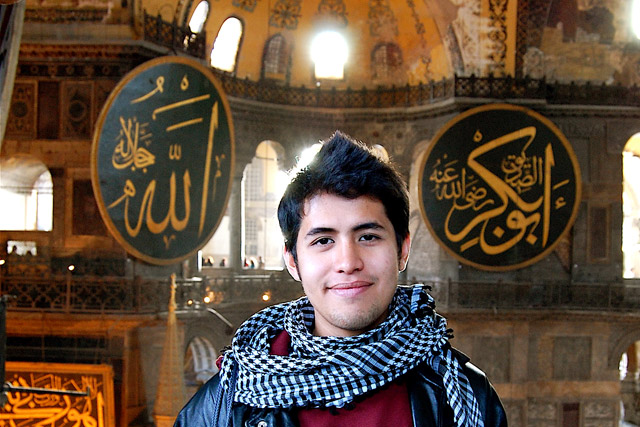Hussein ’11 to Study Public Policy as Junior Summer Fellow

This summer, Jourdan Khalid Hussein ’11 will be given the skills and experiences necessary to create, analyze, implement, evaluate, and affect policy in a multicultural, multiethnic society.
As a Public Policy & International Affairs Junior Summer Institute Fellow, Hussein will spend seven weeks at the Woodrow Wilson School of Public and International Affairs at Princeton University. The program’s mission is to increase leadership opportunities for future global policy leaders in both the public and nonprofit sectors by preparing students for graduate study in related fields.
“The Junior Summer Institute is a highly focused and rigorous academic program that will help you gain a comprehensive understanding of the Woodrow Wilson School and the opportunities available in the fields of public policy and international affairs,” says Jose Ochoa, director of MPP Admissions and Programs Woodrow Wilson School of Public and International Affairs at Princeton.
The program begins June 10 and ends July 30.
“I applied because I knew this is going to change my post-Wesleyan education significantly to an extent that it will provide me with unprecedented opportunities which I could not afford or access otherwise without the fellowship, like financial aid for graduate school in public policy for instance,” Hussein says. “I really hope I can learn and network as much as I can.”
The PPIA Junior Summer Institute helps fellows strengthen their skills in economics, statistics, policy analysis, writing, and public speaking. At the end of the program, students will be able to present a comprehensive final report on a current policy issue that will encompass the skills acquired in their coursework, including the seminar on the intercultural dimensions of policy making, field research, policy analysis, and writing and computer workshops.
About 360 students from across the United States apply for the PPIA fellowship, and of those, 32 are selected. Only three students, including Hussein, are international students.
“I was really overwhelmed when I received the notification e-mail that I was going to be a Junior Summer Fellow,” Hussein recalls. “I texted my Mom and she kept calling me from Jakarta but failed, so basically I was just in awe by myself in my room, wanted to share the good news immediately with someone. I feel so grateful and blessed for this privilege.”
Hussein looks forward to networking with like-minded people during the summer, and becoming one of the 3,000 PPIA alumni in the country.
“Many of the alumni have made significant impacts within their communities,” Hussein says. “Ultimately I want to get in to the best graduate school in public policy and international development. That way, I can contribute in a larger scale, such as advancing development in Indonesia and other developing countries.”
The Princeton program includes classroom instruction with field research in quantitative methods for policy analysis, economics for policy analysis, an international and domestic policy workshop and an intercultural dimension of policy-making seminar. The policy workshop will examine a specific issue in domestic policy or international affairs, and develop students’ ability to use research skills, write policy memos, effectively integrate coursework obtained in statistics and economics into a policy report, and make group presentations.
Extracurricular activities include lectures and off-site visits to observe public policy in action. Students in previous summer programs have had the opportunity to speak with leading practitioners in the field of public affairs, several of whom attended a Junior Summer Institute and are graduates of the Woodrow Wilson School.
The fellowship includes a $1,500 stipend and covers expenses for all courses, textbooks, transportation, housing and meals.

